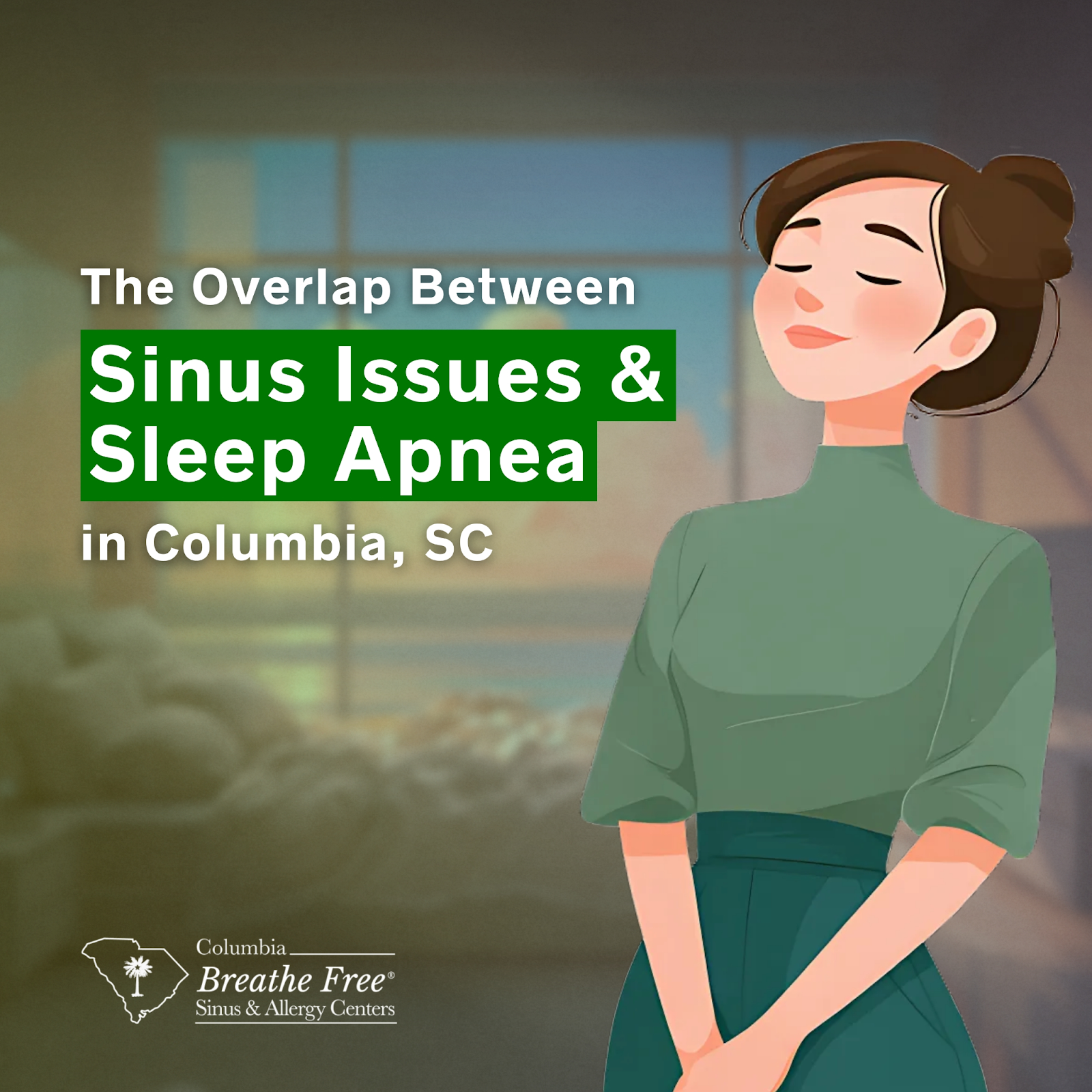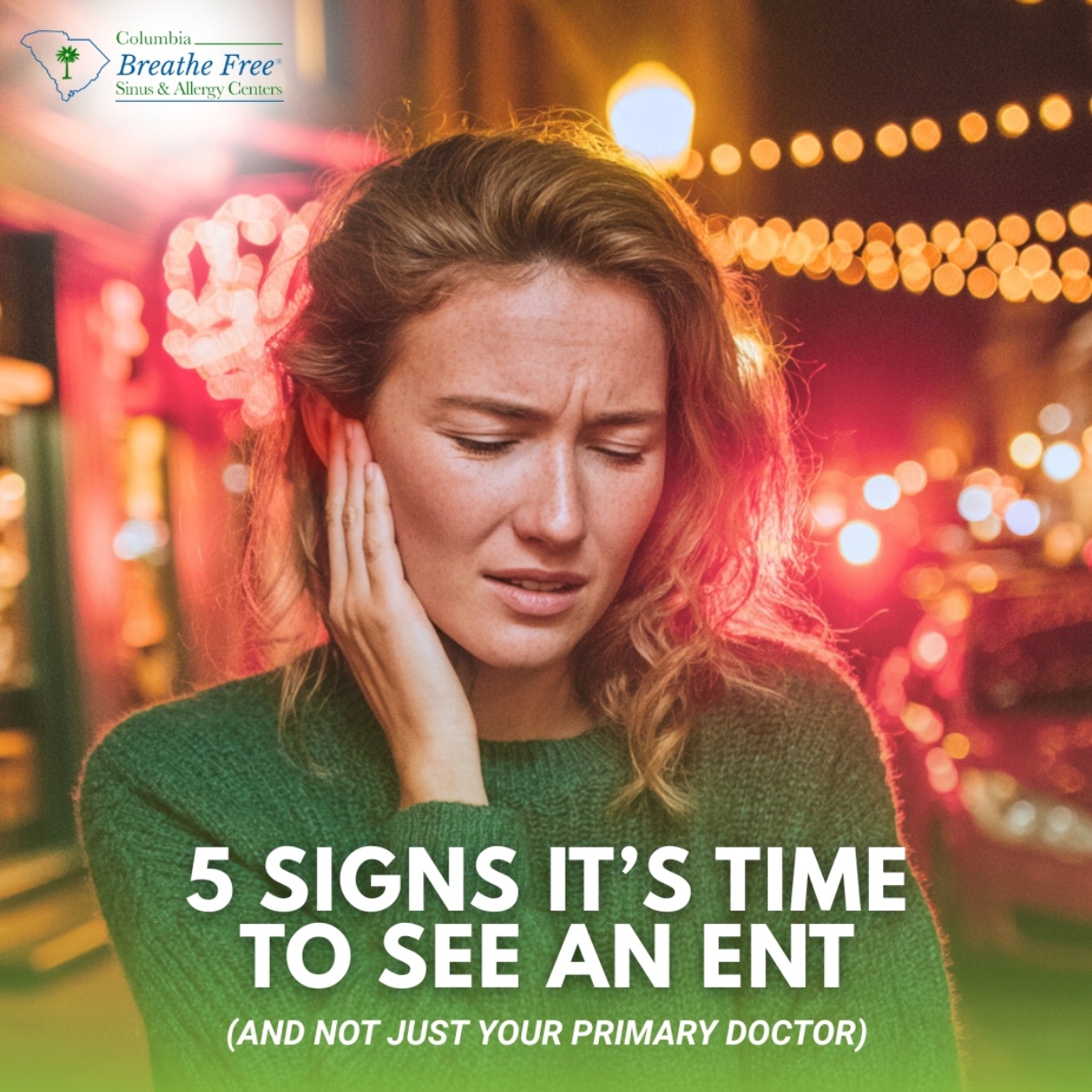.png)
The Overlap Between Sinus Issues and Sleep Apnea in Columbia, SC
A good night’s sleep is essential for physical health, mental focus, and emotional well-being. But when chronic sinus problems and sleep apnea occur together, they can significantly affect your ability to rest. These conditions are common—and often connected—and can lead to long-term disruptions in sleep quality if not properly managed.
In this post, we’ll explain how sinus issues and sleep apnea are related, how they may affect Columbia, SC residents, and what treatment options are available.

What Is Sleep Apnea? A Guide for Columbia, SC Residents
Sleep apnea—specifically obstructive sleep apnea (OSA)—is a condition in which breathing is interrupted repeatedly during sleep. These interruptions are caused by a collapse or narrowing of the upper airway.
This condition affects millions of people in the U.S. and may go undiagnosed for years. Symptoms may include:
- Loud, frequent snoring
- Daytime fatigue or grogginess
- Morning headaches
- Waking up choking or gasping
- Difficulty concentrating
- Mood changes or irritability
OSA is considered a significant medical condition because these repeated breathing pauses may lead to reduced oxygen levels and sleep fragmentation. Untreated sleep apnea has been associated with health risks such as:
- High blood pressure
- Heart disease
- Stroke
- Type 2 diabetes
- Weight gain
How Sinus Problems Can Contribute to Sleep Apnea in Columbia Residents
Many patients in Columbia experience chronic sinus issues, and for some, these problems may overlap with sleep-disordered breathing. Here's how they may be connected:
1. Chronic Nasal Congestion
Inflammation from allergies, sinusitis, or nasal polyps can block airflow through the nose, leading to mouth breathing at night. Mouth breathing may increase airway resistance and contribute to snoring or sleep disturbances. In some cases, it may worsen symptoms of sleep apnea.
2. Inflammation and Swelling
Chronic sinus inflammation can extend beyond the nasal passages, potentially affecting the throat or upper airway. This can increase the likelihood of airway narrowing—one of the key mechanisms in obstructive sleep apnea.
3. Interrupted Sleep Patterns
Postnasal drip, nasal blockage, or facial pain can make it difficult to fall asleep or stay asleep. Repeated awakenings and shallow sleep can result in next-day fatigue—similar to what is experienced in sleep apnea. When both conditions are present, symptoms may become more severe or harder to manage.
4. A Vicious Cycle of Disrupted Sleep
Sleep apnea and sinus issues can exacerbate one another. Sleep loss contributes to inflammation, and inflammation worsens breathing—creating a frustrating cycle for many patients.
Sinus and Sleep Apnea Treatment Options in Columbia, SC
If you're experiencing signs of both sinus issues and disrupted sleep, treatment may help improve your breathing and rest. At Columbia Breathe Free, we offer a range of solutions tailored to each patient’s needs:
✅ CPAP Therapy
A CPAP (Continuous Positive Airway Pressure) machine is a standard treatment for sleep apnea. It delivers steady air pressure to keep your airways open overnight.
✅ Uvulopalatopharyngoplasty (UPPP)
UPPP is a surgical procedure that removes excess tissue in the throat to reduce airway obstruction. It may be recommended when soft tissue is contributing to apnea symptoms.
✅ Radiofrequency Turbinate Reduction
This minimally invasive procedure reduces the size of enlarged nasal turbinates, which may improve airflow and relieve nasal obstruction that interferes with sleep.
✅ Balloon Sinuplasty
Balloon sinuplasty is a non-surgical treatment that opens blocked sinus passages using a small balloon catheter. This may support better breathing for patients with sinus-related congestion contributing to poor sleep.
✅ Septoplasty
For those with a deviated septum, septoplasty may help improve nasal airflow. This can reduce nasal resistance and enhance nighttime breathing.
How Columbia Breathe Free Can Help
At Columbia Breathe Free Sinus & Allergy Centers, we understand the relationship between sinus problems and sleep disorders. Our team uses diagnostic tools—like nasal endoscopy and sleep studies—to evaluate your symptoms comprehensively.
We’re here to help Columbia-area patients find answers and explore safe, effective options that support both sinus health and sleep quality.
If you're struggling with fatigue, nasal congestion, or loud snoring, schedule a consultation. Together, we’ll build a personalized care plan that works for you.
Other Blogs
.png)
Top ENT Specialists in Columbia: What Sets Great Ear, Nose, and Throat Doctors Apart
Finding the right ENT doctor can make all the difference when you're dealing with sinus problems, hearing loss, or throat issues that just won't quit. If you're searching for care in the Columbia area, understanding what separates an average ear, nose, and throat specialist from a truly excellent one will help you make the best choice for your health. At Columbia Breathe Free, patients have access to experienced ENT sp
.png)
How to Choose the Right ENT for Your Symptoms
When ear, nose, or throat problems don’t go away, it can be hard to know what to do next. Maybe your nose always feels blocked. Maybe your ears feel full, or your throat keeps bothering you. These issues can affect sleep, focus, and daily life. At Columbia Breathe Free Sinus & Allergy Centers, patients often ask how to choose the right ear, nose, and throat doctor—also called an ENT—for their symptoms. While no visit can promise answers or outcomes, knowing what to look for can help you feel more confident before scheduling an appointment.

5 Signs It’s Time to See an ENT (and Not Just Your Primary Doctor)
If you’ve ever dealt with persistent ENT issues like chronic nasal congestion, recurring ear infections, severe sinus pain and pressure, and hearing difficulties, then you know how they may affect your daily life, productivity, and comfort, depending on their severity. Many patients today are taking a more proactive approach to their health and may choose to seek care when they notice persistent or worsening symptoms.
The information provided in this article is for informational and educational purposes only and does not constitute medical advice. It is not intended to diagnose, treat, cure, or prevent any disease or medical condition. Always seek the guidance of your physician or other qualified healthcare provider with any questions you may have regarding a medical condition or treatment.
Results may vary: Treatment outcomes and health experiences may differ based on individual medical history, condition severity, and response to care.
Emergency Notice: If you are experiencing a medical emergency, call 911 or seek immediate medical attention.
